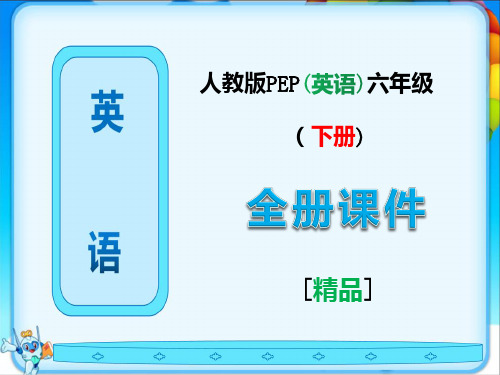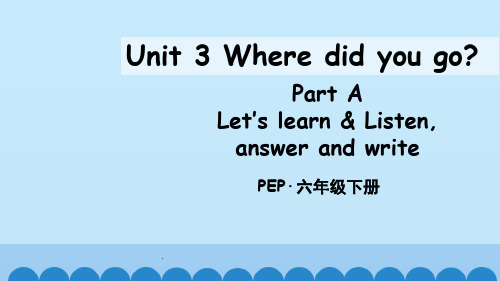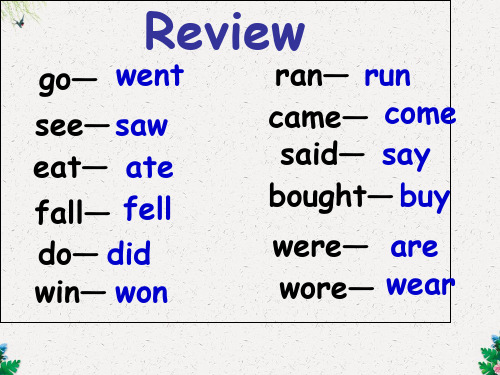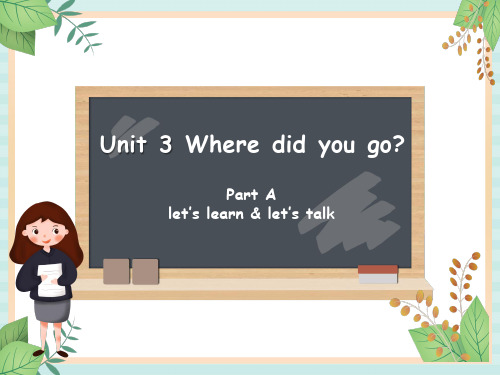人教版英语六年级下册unit3partA部分课件
合集下载
人教PEP六年级下册英语课件-Unit3 PartA Let's learn 3

A:Where did you go on your holiday? B: I went to Xinjiang. A: What did you do there? rode a horse B:I __________.
A:Where did you go on your holiday? B: I went to Hangzhou. A: What did you do there? rode a bike B:I __________.
Pair-work
• • • • A: Where did you go last Saturday? B: I went to ______. A: What did you do there? B: I ______.
washed the clothes cleaned the room watched TV had a cold slept
drank tea
read a film magazine
微博
This is my microblog. You can see my daily life from it.()
A:What did he/she do yesterday ?
B:He/She _____.
went fishing went shopping
went swimming went hiking
: Did you do anything else?
Yes,I rode a bike and then I rode a horse.
Where did you go last Saturday?
/went/
:I went to a forest park.
六年级英语下册全册ppt课件(pep人教版)

3/19/2024
thin
thinner
The tiger is thin. The dog is thinner.
Thin, thinner, the dog is thinner.
3/19/2024
big
bigger
The donkey is big. The horse is bigger.
1.1
PartA
3/19/2024
Warm-up
Let’s play a game.
Line up from shorter to taller. 请男生和女生分开,按从矮到高排成两 队,大家看看谁高?
3/19/2024
Presentation
tall-----taller long----longer young----younger
short----shorter 24
单词新朋友
tall-----taller 更高的 short----shorter 更矮的 old----older更年长的 young----younger更年轻的 long----longer 更长的
3/19/2024
询问他人体重及回答的句型.
How heavy are you / is he/she? I’m/He/She is 48kg.
3/19/2024
Work in pairs.
Practice
What size are Wu Yifan’s shoes? What size are your shoes? Whose shoes are bigger?
3/19/2024
Work in groups
How heavy are you? I’m___kilograms. You’re heavier than me.
thin
thinner
The tiger is thin. The dog is thinner.
Thin, thinner, the dog is thinner.
3/19/2024
big
bigger
The donkey is big. The horse is bigger.
1.1
PartA
3/19/2024
Warm-up
Let’s play a game.
Line up from shorter to taller. 请男生和女生分开,按从矮到高排成两 队,大家看看谁高?
3/19/2024
Presentation
tall-----taller long----longer young----younger
short----shorter 24
单词新朋友
tall-----taller 更高的 short----shorter 更矮的 old----older更年长的 young----younger更年轻的 long----longer 更长的
3/19/2024
询问他人体重及回答的句型.
How heavy are you / is he/she? I’m/He/She is 48kg.
3/19/2024
Work in pairs.
Practice
What size are Wu Yifan’s shoes? What size are your shoes? Whose shoes are bigger?
3/19/2024
Work in groups
How heavy are you? I’m___kilograms. You’re heavier than me.
人教版六年级英语下册 Unit3 Part A Let’s learn

Listen and repeat
Today was a sunny day. I went to a forest park. I rode a bike with my friends.
I rode too fast and fell off my bike. I hurt my foot.
John has some friends. Who are they?
B: I rode a bike with my father/ my mother …
John wore a helmet. But what happened?
He fell off the bike. He hurt his foot过去式
hurt
hurt my foot
went camping go的过去式
went swimming
went running
went fishing
went shopping
What did John do in Xinjiang?
He went camping.
Went, went, I went camping.
What else did John do in Xinjiang? went fishing
Carl
Meimei
Mr Guo
Listen, answer and write What did they do yesterday?
He ___________________ and _________________. Carl
She ____________________ ____________________.
What did John do in Xinjiang?
六年级下册英语课件-Unit3 PartA Let's talk 3_人教PEP

Listen and answer
1.Where did John go over his holiday? Mt.Tianshan.XinJiang
2.What did he do? He rode a horse and saw lots of grapes there.
Listen and judge
Practice
what happened ?what happened? Fell on, fell on, I fell on watermelons.
What’s the date?
It’s May.1st. It’s the Labour Day.
ቤተ መጻሕፍቲ ባይዱ
Where did you go over your holiday?
fell off从…上跌落
fell over摔倒
fell on掉落在…上
Practice
What happened? what happened ?(怎么了) Fell off ,fell off, I fell off my bike.
Practice
what happened ?what happened ? Fell over, fell over, I fell over.
I went to Mt. Tianshan, Xinjiang.
Mt.Tianshan
Turpan
photos of grapes grapes
horse
mule
let‘s try
The second class is beginning. John is at home.
John hurt his foot.
六年级英语下册 Unit 3 Part A 课件 人教PEP版

What else did John do in Xinjiang?
钓鱼;捕鱼
went fishing
去钓鱼
What did John do in Xinjiang?
He went fishing.
Went, went, I went fishing.
What did John do in Xinjiang?
Look, it's very small. Oh, yes. It _lo_o_k_s_l_ik_e_a__m_u_l_e_! Did you
go to Turpan? _Y_e_s,__w_e_d_i_d_. We _sa_w__lo_t_s_o_f__g_ra_p_e_s_ there, but we __c_o_u_ld_n_’_t __ eat them. They _w_o_n’_t_b_e__r_ea_d_y_ till August.
hurt my foot (hurt的过去式) (使)受伤
foot
leg
hurt my _______
hand
finger
What did John do? He rode a bike. He hurt his foot.
Act and guess.
Rules: One student does the actions, the others guess which phrase he/she is performing.
——Let’s go to the library. ——All right. ③用于征询意见 I’m busy now. Is tomorrow all right?
summary
句型: 疑问词where+助动词did+主语 +动词原形+其他? Where did you go …?
- 1、下载文档前请自行甄别文档内容的完整性,平台不提供额外的编辑、内容补充、找答案等附加服务。
- 2、"仅部分预览"的文档,不可在线预览部分如存在完整性等问题,可反馈申请退款(可完整预览的文档不适用该条件!)。
- 3、如文档侵犯您的权益,请联系客服反馈,我们会尽快为您处理(人工客服工作时间:9:00-18:30)。
I usually go swimming. I usually watch TV. I usually play football. I usually play the piano.
What did you do last weekend? 你上个周末做了什么?
I did homework. I washed the clothes. I visited grandparents.
clean the room 打扫房间
go to a park 去公园
go swimming 去游泳
watch TV 看电视
play football 踢足球
play the piano 弹钢琴
问句:What do you usually do on the weekend? 在周末你通常做什么?
• swim — Biblioteka wam 游泳 get — got 得到
• buy — bought 买
sing — sang唱歌
• take — took 乘坐;拍照
• eat — ate 吃
have — had 有
• see — saw 看
Homework: 1. 熟记动词原形变过去式的规律。 2. 熟记本单元所学过去式的短语。 3. 完成练习本上的作业。
答句:I + 动词原形构成的 短语。 例如: I usually watch TV.
我通常看电视。
What do you usually do on the weeken 周末你通常做什么? I usually do homework. I usually wash the clothes. I usually visit grandparents. I usually clean the room. I usually go to a park.
• 4.以原音字母+y结尾的,直接+ed. • 例如:play玩—played 玩了 • 5. 一般情况直接+ed. • 例如:want 想要—wanted想要了
• 以上是一些有规律的动词,如果遇到没有规 律的只能死记硬背了。六年级常见的有:
• do — did 做
go — went 去
• read — read 阅读 fly — flew 飞
visited grandparents 拜访了(外)祖父母
clean the room 打扫房间 cleaned the room 打扫了房间
go to a park 去公园 went to a park 去了公园
go swimming 去游泳 went swimming 去了游泳
watch TV 看电视 watched TV 看了电视
谢谢观赏
play football 踢足球 played football 踢了足球
play the piano 弹钢琴 played the piano 弹了钢琴
• 动词原形变动词过去式形式的规律: • (注意动词原形变过去式ed后,意思变成…了) • 1.以不发音的e结尾的在词尾加-d。
• 如:like喜欢—liked 喜欢了 live居住—lived居住了
I cleaned the room.
I went to a park.
I went swimming. I watched TV. I played football. I played the piano.
写出下列动词的过去式:
do
→ did
→ wash
washed
→ visit
visited
• 3.动词过去式的用法:当要表达已经过去了 的事情时,用过去式。
• 例如:我看了电视。
•
I watched TV.
• 4.表过去的时间通常有:last+时间 “上个…”
• yesterday昨天
do homework 做家庭作业
wash the clothes 洗衣服
visit grandparents 拜访(外)祖父母
• 2.以辅音字母+元音字母+辅音字母(简称辅元辅)结尾的, 先双写最后一个辅音字母,再+ed.
• 例如:trip旅行 —tripped 旅行了 stop停止—stopped停止了
• 3.以辅音字母加y结尾的动词,先把y变成i,再加-ed。如: study 学习 —studied 学习了 carry 取—carried 取了
人教版英语六年级下册 unit3partA部分课件
• 1.动词原形(就是动词本身,如:do, dive等)
• 2.动词ing形式:原形+ing,如doing, diving等)
• (用途:一般用在like后,或者表示正在进行的 动作)
• 例如:I like diving. 我喜欢跳水。
•
I am doing homework. 我正在做作业。
→ clean
cleaned
go → went
→ watch
watched
→ play
played
do homework 做家庭作业 did homework 做了家庭作业
wash the clothes 洗衣服 washed the clothes 洗了衣服
visit grandparents 拜访(外)祖父母
• 3.动词单三形式:原形+s/ es,如does, dives等)
• (用途:一般放在主语单数后面,表示经常做的事 情)
• 例如:He often dives.他经常去跳水。
• 1.动词过去式的标志:在原形后+ed
• 2.动词过去式翻译为:…了
• (例如:watched TV看了电视,played football踢了足球)
